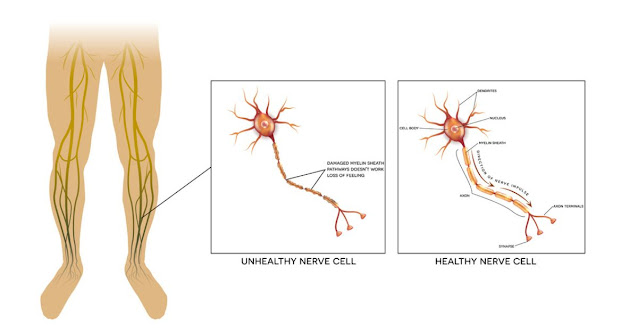Peripheral nerve injury can significantly impact a person's quality of life, affecting their ability to perform daily tasks and enjoy physical activities. This type of injury occurs when the peripheral nerves, which connect the central nervous system to the rest of the body, are damaged.
In this blog post, we will delve into what peripheral nerve injury entails, explore the symptoms of damaged nerves, and focus on the treatment options available for foot nerve damage.
What is Peripheral Nerve Injury?
Peripheral nerve injury refers to any damage or impairment to the peripheral nerves, which transmit signals between the brain, spinal cord, and the rest of the body. These nerves are responsible for controlling muscle movement, sensation, and autonomic functions like heart rate and blood pressure regulation. Peripheral nerve injuries can occur due to trauma, compression, inflammation, or diseases such as diabetes.
Symptoms of Damaged Nerves
When peripheral nerves are injured, various symptoms may arise, depending on the location and severity of the damage. Here are some common signs of damaged nerves:
a) Numbness and Tingling: Individuals may experience a loss of sensation or a sensation of pins and needles in the affected area. This can hinder their ability to feel touch, temperature, or pain.
b) Muscle Weakness: Weakened or atrophied muscles may result from nerve damage, leading to difficulties with movements or tasks that require strength and coordination.
c) Pain: Nerve pain can manifest as sharp, shooting pain or a constant burning sensation. The pain may radiate along the affected nerve pathway.
d) Loss of Reflexes: Damaged nerves can disrupt normal reflex responses. Reflexes that are typically involuntary, such as knee-jerk reactions, may become diminished or absent.
e) Motor Function Impairment: In some cases, peripheral nerve injury can affect motor function, causing difficulties with muscle control and coordination.
Foot Nerve Damage Treatment
Treating foot nerve damage requires a multidisciplinary approach aimed at relieving symptoms, promoting nerve regeneration, and restoring function.
Here are some common treatment options:
a) Medications: Nonsteroidal anti-inflammatory drugs (NSAIDs), such as ibuprofen, can help reduce pain and inflammation associated with nerve damage. Additionally, certain medications like antidepressants and anticonvulsants can be prescribed to alleviate neuropathic pain.
b) Physical Therapy: Physical therapy plays a vital role in restoring mobility and function after peripheral nerve injury. Therapeutic exercises and techniques can help improve strength, coordination, and balance. Electrical stimulation and manual therapies may also be employed to stimulate nerve regeneration.
c) Surgical Intervention: In severe cases of foot nerve damage, surgical intervention may be necessary. Nerve decompression or repair surgeries aim to remove any compression or repair the damaged nerve, allowing for potential recovery.
d) Lifestyle Modifications: Making certain lifestyle changes can aid in the management of foot nerve damage. These may include maintaining a healthy weight, managing blood sugar levels in cases of diabetic neuropathy, and avoiding repetitive motions or activities that may further damage the nerves.
Also read: Trigeminal Neuralgia: What is it?
Conclusion
Peripheral nerve injury can have a profound impact on an individual's well-being, particularly when it affects the nerves in the feet. Recognizing the symptoms of damaged nerves is crucial for timely intervention and treatment.
Although complete recovery may not always be possible, various treatment options can alleviate symptoms, improve function, and enhance the overall quality of life.
If you suspect you have foot nerve damage or experience any of the symptoms mentioned, it is important to consult a neurologist for a proper diagnosis and an appropriate treatment plan.

Comments
Post a Comment